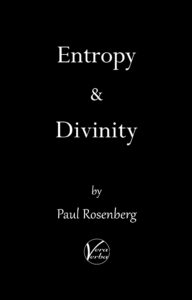 Entropy & Divinity is a book that I wrote in 2010, pouring into it all the best I could muster at the time. It was very much a milestone to me, and from that point I went on to launch Free-Man’s Perspective, just a few months later. Looking back, it was a necessary consolidation point for me.
Entropy & Divinity is a book that I wrote in 2010, pouring into it all the best I could muster at the time. It was very much a milestone to me, and from that point I went on to launch Free-Man’s Perspective, just a few months later. Looking back, it was a necessary consolidation point for me.
There is a lot of unique material in this book, much of it not repeated in any of our Free-Man’s Perspective issues. It’s fairly dense at times, though not actually a difficult read. And it remains a reference for me; one I turn back to fairly often.
Here is the opening of the book:
This small book will claim that man can become divine – by choice. This claim is neither blasphemous nor evangelical. The word “divine” was carefully chosen and will be clearly defined below. Whoever has a need to be offended, will be offended.
This book will also explain the inner workings of the human mind. Humans not only have a mind, but, to a very large extent, they are a mind. Regardless of this fact, the fear of knowing one’s mind is widespread as this book is being published. It seems that people fear their minds because of stories told by pseudo-specialists with questionable motives.
The uncomfortable point this book makes is that “transcendent man” is the natural human state: that humans are structured for it. Neither miracles nor exceptional talents are required.
What holds man back from transcendence are internal conflicts and a great deal of negative training over his lifetime. However, this book is not really about what is wrong, but how things can be made right. It will define problems only as required and will not seek to place blame.
This book uses references to both physics and scripture. This should not be shocking for a book entitled Entropy & Divinity, nor should it be surprising that those humans who have made life-long studies of entropy or divinity have produced useful thoughts on their subjects of interest.
This book does not claim that references to physics prove it correct. These examples are useful mostly because of the symmetries they illustrate. Symmetry does not prove anything, but there are valid comparisons between the structural behavior of nature and the structural behavior of humanity (which is also part of nature).
Likewise, this book does not claim that references to the Bible prove it correct, or that they prove the Bible to be correct.
Before proceeding, consider this quote from a psychologist named Abraham Maslow:
Human history is a record of the ways in which human nature has been sold short. The highest possibilities of human nature have practically always been underrated.
And here is the book’s definition of divinity:
In this book, “divinity” will mean: The active and willful transcendence of entropy.
This definition, however, is not full. The natures of an entropic man and a counter-entropic man develop differently. In the end, not only the actions, but the characters of the two men, will be different. The act of transcending entropy changes the central mechanism, which is the man himself.
The act of willfully transcending entropy – of continually choosing it and pursuing it – changes people, making them better in many ways. Interestingly, many of the characteristics that religious people attribute to God or saints (such as love) also accrue to people who are living a counter-entropic life.
This difference of character is why the word “divine” is used, rather than “creative.” Being counter-entropic changes a man internally. (St. Paul goes so far as to call such a man a “new species.”) It is in any case clear that the counter-entropic man is different and better than the entropic man, and that he increases this difference and superiority as time goes on.
**
